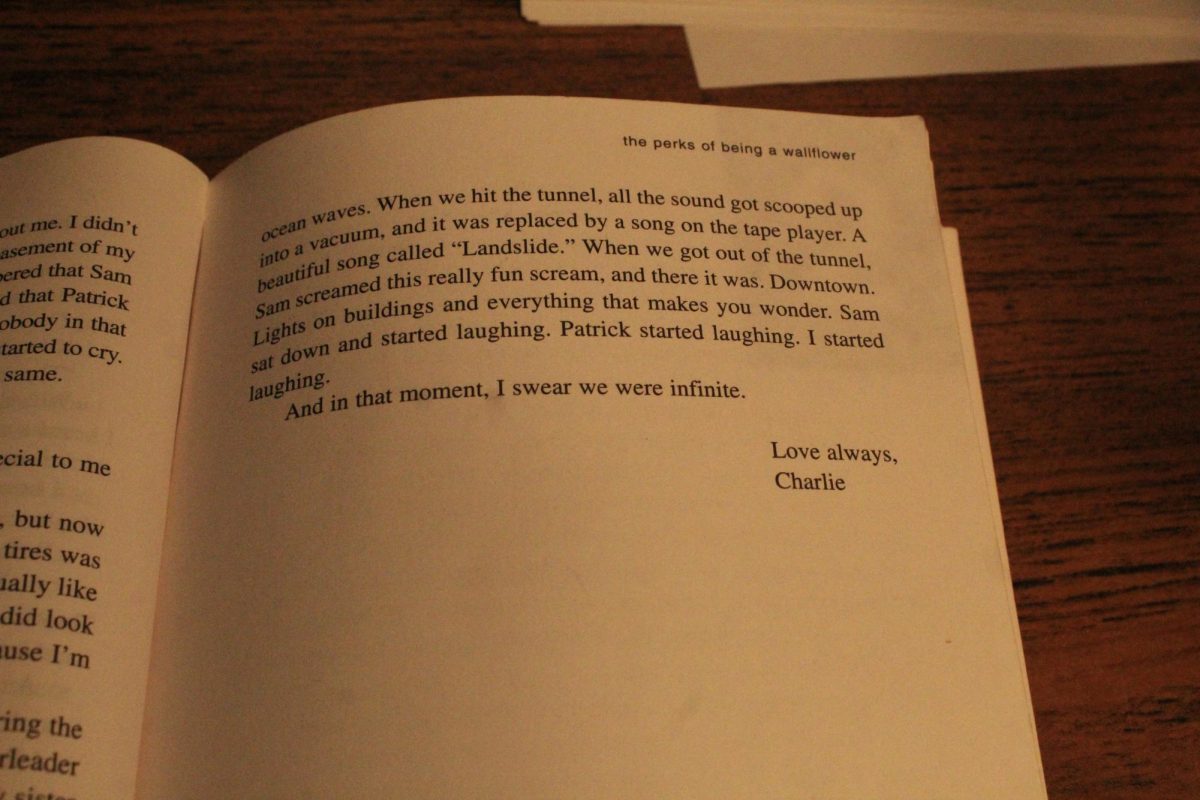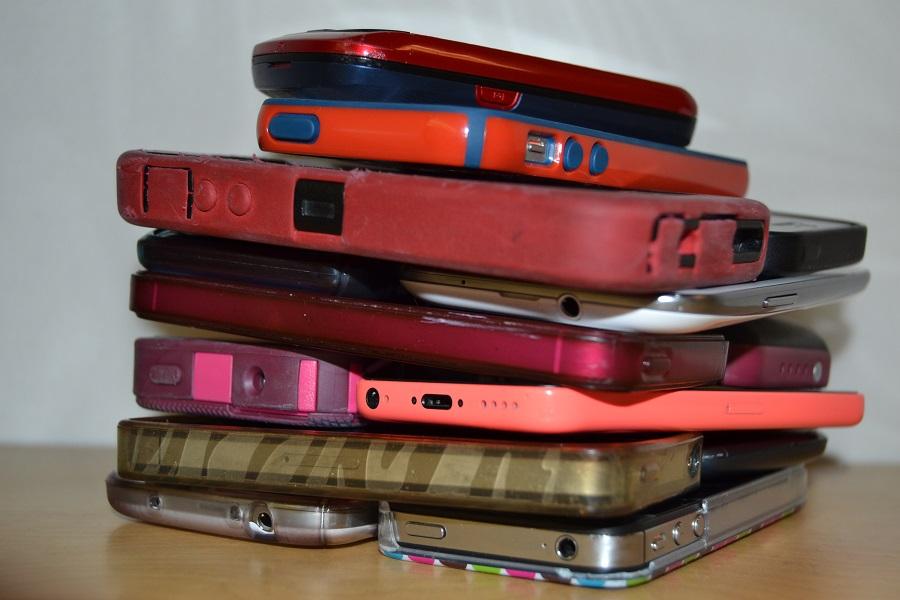Friend or foe? The cell phone debate
Is your phone helping or harming you?
Since 2012, smartphone usage has grown by 81 percent. Is cell phone usage a positive or negative hobby? This question is frequently debated in modern society. Writers Sarah Payne and Lauren Pantleo analyze the pros (Sarah) and cons (Lauren) of cell phones.
SAFETY:
Sarah: A student is on their way home from an away game. A car comes speeding down the road, heading straight at them. Instinctively, they jerk the steering wheel to swerve out of the way. Their car ends up in the ditch along the side of the road. They get out of the car and call their parents to have someone pick them up.
Without cell phones, people who get in crashes or accidents don’t have a quick way to call for help. Someone can be left stranded until another person happens to come along, and there’s no telling how long that could take. Cell phones allow for easy communication between friends and family in case of an emergency or serious accident.
Lauren: Cell phones aren’t entirely safe; in fact, they may even be a cause of cancer. Research is being conducted to find out if this is true.
According to the National Cancer Institute at the National Institutes of health, “Cell phones emit radiofrequency energy, a form of non-ionizing electromagnetic radiation, which can be absorbed by tissues closest to where the phone is held.”
I would prefer not to have cancer due to something I can prevent. This is a major con that may be provided by cell phones.
Also, a person could be added to random conversations with unknown people because someone had the wrong number. One day, I was added to a group chat with people I didn’t know. They didn’t even speak English. It’s a danger to anyone if random numbers can be contacted at any point in time.
Cell phones can be a hazard to both health and privacy.
KEEPING IN TOUCH:
Sarah: Before cell phones were invented, a person had to stay relatively close to the home phone when waiting for a call from a relative, co-worker, or classmate. If a friend needs to call, but a family member needs to talk to a different person, someone has to give up their individual talking time so the other can get their work done. Having a cell phone enables people to have conversations without interfering with people around them. Cell phones allow for relatives to send updates about job interviews, sporting events, competitions, and any other significant events.
Lauren: Let’s be honest, is it enjoyable to text everyone all of the time? Keeping in touch with people can be a great thing, until it becomes a little too much. A vacation can be more relaxing without the distraction of a cell phone, but simply explaining this thought process can make others upset.
Along those lines, tone is lost within a text. I can’t tell how many times I have been texting someone something sarcastic, but they take it the wrong way. The joke can be ruined after having to explain the intended tone in the original message.
In addition to losing tone, a person can lose literacy and personable skills. We’ve all messaged or texted a person who sounds great through text, but as soon as they are seen in person, they can barely speak. It’s like they’re a completely different person. What happened to that person you thought you knew online? Using abbreviations such as lol, brb, or whatevs affects how someone will use those words everyday.
AT YOUR FINGERTIPS:
Sarah: Along with keeping in touch with distant friends and relatives and being able to alert someone of an accident, Internet-capable cell phones give users a vast majority of knowledge and answers for any questions that may come up.
Steve Ballmer, an American businessman, said “The number one benefit of information technology is that it empowers people to do what they want to do. It lets people be creative. It lets people be productive. It lets people learn things they didn’t think they could learn before, and so in a sense it is all about potential.”
I believe that cellphones are dangerous only when used improperly, just like most other things (seatbelts, pencils, scissors, the list could go on.) Just because something is dangerous in some cases, doesn’t mean the thing in and of itself is inherently bad. The ability to learn, grow, and discover through the vast expanse of knowledge provided to us outweighs the dangers.
Lauren: In my opinion, cell phones are distracting. Instead of doing homework, or listening to family at dinner, people are texting. I agree that texting is a lot more fun, but homework comes first. With a phone always at someone’s fingertips, distractions come much more easily.
Texting and driving is becoming a huge issue as well. “In 2011, at least 23% of collisions involved cell phones.” according to Textinganddrivingsafety.com.
Phones make it easier to cheat. If technology didn’t make it easier, why do teachers tell us to put it away when we take a test? With the availability of internet or simply texting friends for the answer, there are multiple ways to cheat. Common sense media stated “The poll, conducted by The Benenson Strategy Group, revealed that more than 35% of teens admit to cheating with cell phones, and more than half admit to using the Internet to cheat.”
What do you think? Do the benefits of cell phones outweigh the risks? Let us know in the comments.
Want to help the Herd? Please consider supporting the Periscope program. Your donation will support the student journalists of CHS and allow us to purchase equipment, send students to workshops/camps, and cover our annual website hosting costs.

Sarah Payne is in 10th grade. She works in Periscope as a Perspectives Writer. She reads, writes, and watches movies. Her favorite book is the Hobbit,...

Lauren Pantleo is in 10th grade. Her staff position on Periscope is Perspective Writer. She does track and was a competitive swimmer. Lauren enjoys music...







































































































Francesca DiPaola • Nov 3, 2014 at 8:37 am
I see cellphones as both enemies and friends. They can be great for assisting learning, having the whole world at your finger tips. They are great for communication, kids need to be able to talk to their friends, it helps with depression and anxiety, and everyone knows friends make it easier to get through the school day. The only problem is kids not being smart or safe with their cellphones. It is the kids that make bad decisions like cyber bullying, sexting, texting and driving, or texting during class while the teacher is teaching that give cellphones the bad rap. If kids were just smart about it, they could simply be used for all the benefits they posses.
Bry Youtzy • Oct 29, 2014 at 11:04 am
I think there are many positive and negative affects to the use of cell phones in certain situations.
Claire Hillison • Oct 29, 2014 at 8:00 am
I think that cell phones are a positive as long as it doesn’t rule your life. I don’t have a smart phone so they don’t affect my life as much as others but I have seen people who get addicted to their phones. As long people still look up from their screens when you talk to them then I think we are okay.
Spencer Kendall • Oct 23, 2014 at 8:33 am
I think the benefits of cellphones do outweigh the risks. In the society we live in today its almost necessary to have a cell phone or some other form of tech on you at all times, I know I feel almost naked without having my phone on me. I also think that people do use phones a little bit too much. at dinner, in class, using a phone is disrespectful.
Jamie Miller • Oct 23, 2014 at 8:26 am
I think cell phones have both huge pro’s and huge con’s. I think they are an excellent resource until they become overpowering. Too many people, sometimes including myself, become addicted to their technology and then it becomes a negative distraction. It is good in cases like making plans, notifying parents of an accident or calling 911 if necessary. Also in situations where you need directions or you have a little down time and you want to play a game, there are apps for that. When a cell phone, or technology becomes a distraction and/or safety concern is when it becomes negative. For example, texting and driving, or even staying up playing games, snapchatting or Facetiming all night and becoming sleep deprived. Overall, I think cell phones are more a positive thing than negative until they become overpowering.
Rachel Day • Oct 8, 2014 at 11:44 am
I really like the way this article was written! I think cell phones are a very good thing, but at the same time, they are proof that you can have too much of good thing. Cell phones are great for keeping in touch, even for the little things like letting your parents know where you are going to be. Cell phone use becomes a negative thing when it takes away from real life interactions. There are definitely times when having a cell phone is positive, but there are times, such as when you are driving, that cell phones are too much of a distraction.
Chanele Davis • Oct 7, 2014 at 1:16 pm
I totally agree with Hannah! Of course there is a negative side to everything, but cell phones have a huge positive impact on my life. In middle school I used to walk to school everyday, so that is why my parents first bought me a cell phone. In case of any emergency, I can call one of my parents or 911 at ease. The growing app store also offers endless convenient apps; maps for example is now something I use weekly, no need for expensive navigation systems anymore! But at the end of the day too much of anything can be bad for you, cell phones can be very addicting. Whenever they begin to interfere with your social and family life, or especially when you’re driving that is when cell phones become negative!
Julia Pantleo • Oct 2, 2014 at 6:16 pm
Really, Lauren? You don’t want to text everyone all the time? This is news to me. 😛 Haha! Great job on this article you guys!
Abigail • Oct 2, 2014 at 3:46 pm
I would absolutely agree that cell phones pose many pros and cons. New innovations and greater access to smart phones has created great opportunities for students to use technology. It really comes down to how a person chooses to use their phone. Ultimately, smart phones are not bad in and of themselves. We just have to make the choice to be responsible when using them.
Jack Davenport • Oct 1, 2014 at 2:42 pm
I agree with Mr. Milligan. Cell Phones pose both pros and cons, and there really is no correct theory on how they effect society. Cell phones are beneficial in situations such as being stuck in a ditch or needing to communicate imperative information to one’s parents, but that is about it. Cell phones have been known to pose distractions and issues, especially when it comes to school and work. With apps such as social media or games, one’s work ethic can be effected, which decreases aspects such as grades or assignments. In all honesty, it really depends on how much focus the owner of the cell phone has, and how much mental power they have to push away their cell phone while at school or when they are trying to complete homework.
Hannah Getz • Oct 1, 2014 at 11:05 am
I personally think that cell phones have more of a positive impact on our lives than negative. Some positive influences that it has had on my life personally is being able to look up addresses if I get lost (which happens frequently). Also when my parents and I need to figure out plans but have no time, we just send a text to let each other know what we are doing and where we are at. I also found that cell phones are huge in safety. If i am driving to my friends house, once I arrive I text my parents to let me know that i arrived safely. Lastly, cell phones are a great bridge to keep in touch with friends or family that are hard to see frequently. Although there are definite negatives to cell phones, I believe that there are more positives.
Jake Milligan • Sep 30, 2014 at 3:50 pm
I personally see cell phones as positive in most instances, but can become negatives when they start distracting people from interactions with others and from living their lives. There is so much to do in life that Twitter and Snapchat can take time away from these experiences. Although these networking sites help people stay in touch with friends, (a positive), I personally believe that too much time spent on these website can have a negative impact on lives overall.